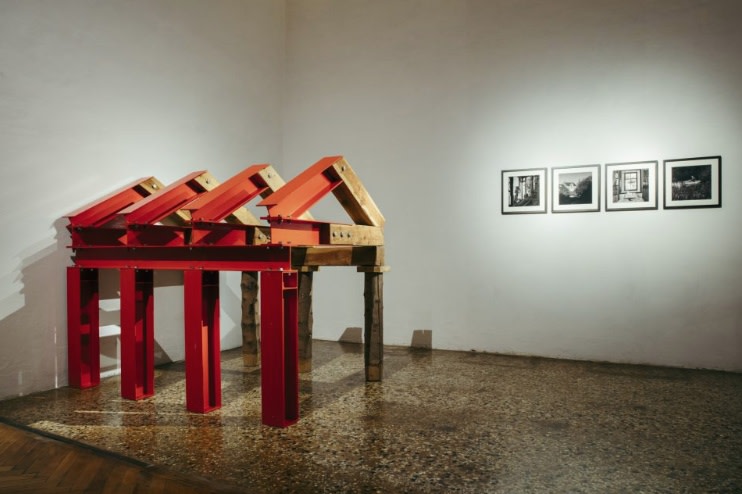
Ian Hamilton Finlay in Machines à Penser at Fondazione Prada, Venice
Curated by Dieter Roelstraete, the exhibition (26 May–25 November 2018) explores the correlation between conditions of exile, escape and retreat and physical or mental places which favour reflection, thought and intellectual production.
“Machines à penser” focuses on three major philosophers of the 20th century: Theodor W. Adorno (1903-1969), Martin Heidegger (1889-1976) and Ludwig Wittgenstein (1889-1951). The latter two shared a life-long need for intellectual isolation: Heidegger spent long periods of his life in a secluded hut in the village of Todtnauberg in the Black Forest in Germany, whilst Wittgenstein retreated on several occasions to a small mountain cabin situated in a fjord in Skjolden, Norway. Adorno, on the other hand, was forced into exile from his native Germany during by the Nazi regime, first to Oxford and then to Los Angeles, where he wrote Minima Moralia, a collection of aphorisms that also reflects on the fate of forced emigration. These reflections inspired the installation conceived by the Scottish artist and poet Ian Hamilton Finlay in 1987 titled Adorno’s Hut, a centerpiece of the exhibition alongside architectural reconstructions of the actual huts of Heidegger and Wittgenstein.
Image: Ian Hamilton Finlay, Adorno's Hut, 1987
Image courtesy Fondazione Prada, Milan/Venice
- Doug Aitken
- Njideka Akunyili Crosby
- Milton Avery
- Jules de Balincourt
- Ali Banisadr
- Hernan Bas
- María Berrío
- Varda Caivano
- Saskia Colwell
- Verne Dawson
- Stan Douglas
- Elmgreen & Dragset
- Inka Essenhigh
- Ian Hamilton Finlay
- Barnaby Furnas
- David Harrison
- NS Harsha
- Alex Hartley
- Secundino Hernández
- Ilse D’Hollander
- Christian Holstad
- Kudzanai-Violet Hwami
- Chantal Joffe
- Isaac Julien
- Idris Khan
- Yayoi Kusama
- John Kørner
- Doron Langberg
- Wangechi Mutu
- Alice Neel
- Maria Nepomuceno
- Chris Ofili
- Jorge Pardo
- Celia Paul
- Grayson Perry
- Paula Rego
- Tal R
- Conrad Shawcross
- Hedda Sterne
- Do Ho Suh
- Sarah Sze
- Adriana Varejão
- Suling Wang
- Stephen Willats
- Flora Yukhnovich
- Doug Aitken
- Njideka Akunyili Crosby
- Milton Avery
- Jules de Balincourt
- Ali Banisadr
- Hernan Bas
- María Berrío
- Varda Caivano
- Saskia Colwell
- Verne Dawson
- Stan Douglas
- Elmgreen & Dragset
- Inka Essenhigh
- Ian Hamilton Finlay
- Barnaby Furnas
- David Harrison
- NS Harsha
- Alex Hartley
- Secundino Hernández
- Ilse D’Hollander
- Christian Holstad
- Kudzanai-Violet Hwami
- Chantal Joffe
- Isaac Julien
- Idris Khan
- Yayoi Kusama
- John Kørner
- Doron Langberg
- Wangechi Mutu
- Alice Neel
- Maria Nepomuceno
- Chris Ofili
- Jorge Pardo
- Celia Paul
- Grayson Perry
- Paula Rego
- Tal R
- Conrad Shawcross
- Hedda Sterne
- Do Ho Suh
- Sarah Sze
- Adriana Varejão
- Suling Wang
- Stephen Willats
- Flora Yukhnovich
Victoria Miro Venice
San Marco 1994,
Calle Drio La Chiesa
30124 Venice, Italy
t: +39 041 523 3799
info@victoria-miro.com
View map
Opening Times
During exhibitions:
London: Tuesday–Saturday: 10am–6pm.
Venice: Tuesday–Saturday: 10am–1pm & 2–6pm.
We are also closed on Sundays, Mondays and public holidays.
Admission free.
Enquiries
All general enquiries should be sent to
info@victoria-miro.com
Victoria Miro does not accept unsolicited artist applications.
Before contacting or subscribing please read our Privacy Policy
We respect the choices you make about how you would like to hear from us. You will find links at the bottom of all emails we send from our mailing list which allow you to Update your preferences to change the way we contact you, or Unsubscribe if you want to opt out.
Read our Modern Slavery Statement here.
Read our sustainability statement here.
Subscribe
Staff contact details
Directors
Sales
Exhibitions
Communications
Operations
Technical Services
Finance
This website uses cookies
This site uses cookies to help make it more useful to you. Please contact us to find out more about our Cookie Policy.